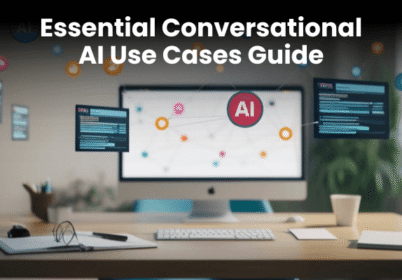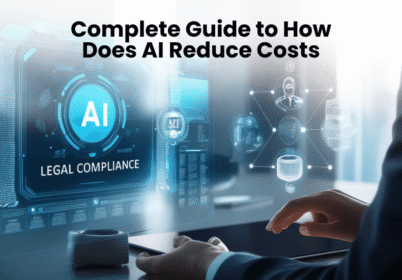Notion AI vs ChatGPT: Which AI Tool is Right for You in 2025?
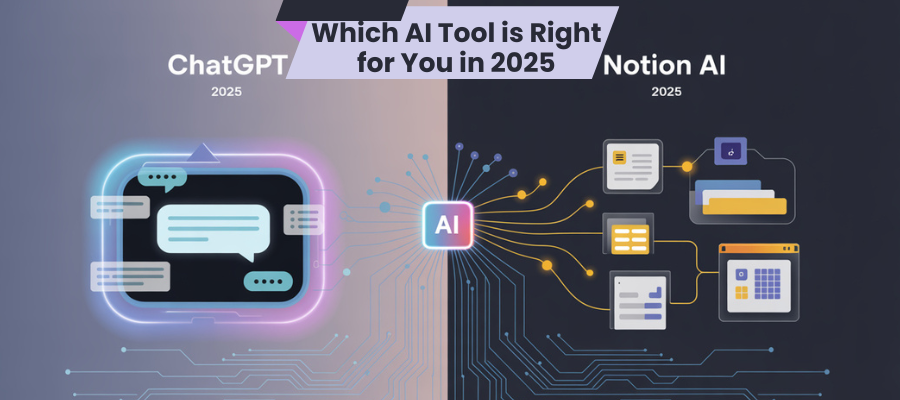
Table of Contents
In 2025, AI-powered productivity and writing tools have become essential components of our digital workflows. Among these innovations, Notion AI and ChatGPT stand out as two widely adopted platforms that serve different purposes in the AI ecosystem.
Notion AI vs ChatGPT represents a comparison between two distinct approaches to AI assistance—one focused on enhancing productivity within the Notion workspace, and the other functioning as a versatile conversational AI applicable across multiple contexts. Notion AI operates as an integrated productivity assistant designed specifically to enhance the Notion workspace experience. Meanwhile, ChatGPT functions as a standalone conversational AI with broader applications across various domains.
Understanding the differences between these tools has become increasingly important as organizations and individuals seek to optimize their digital workflows. This article provides a comprehensive comparison of Notion AI vs ChatGPT, examining their features, strengths, limitations, and ideal use cases. By the end, you will have a clear understanding of which tool better aligns with your productivity requirements, content creation needs, and workflow integration preferences.
Table of Contents
What is Notion AI?
Notion AI represents an integrated artificial intelligence assistant designed specifically for the Notion workspace environment. Unlike standalone AI solutions, Notion AI operates directly within Notion documents, databases, and workspaces without requiring users to switch between different applications or interfaces.
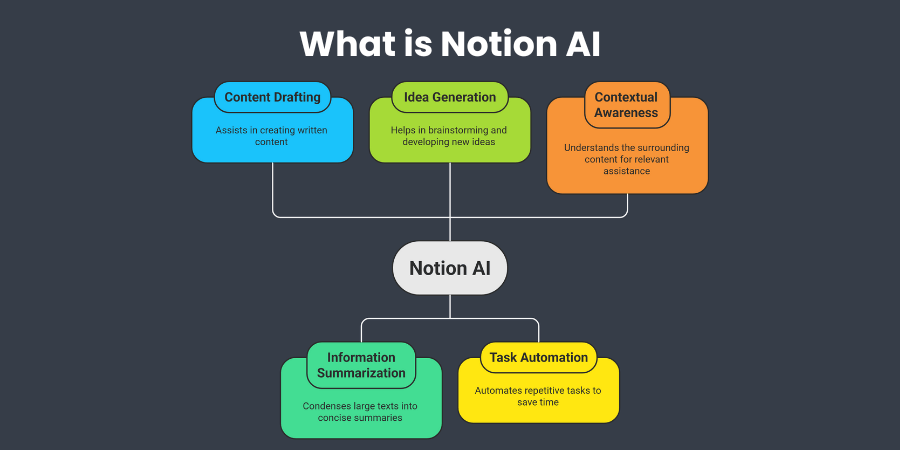
The primary purpose of Notion AI centers on augmenting productivity within the Notion ecosystem. It assists users in drafting content, summarizing information, generating ideas, and automating repetitive tasks—all without leaving their Notion workspace. This integration allows for contextual awareness, as the AI can access and understand the surrounding content within Notion documents to provide more relevant assistance. Notion AI works by processing natural language prompts entered directly into Notion pages.
Users can invoke the AI assistant through a simple command interface, allowing them to request specific actions such as summarizing text, drafting emails, generating lists, or expanding on ideas. The AI then processes these requests within the context of the current document and generates appropriate responses directly on the page. Tip: When using Notion AI for the first time, start with simple requests like summarization or bullet point generation to understand its capabilities before moving to more complex tasks.
Key Features of Notion AI
Notion AI offers a comprehensive suite of productivity-enhancing capabilities designed specifically for the Notion environment:
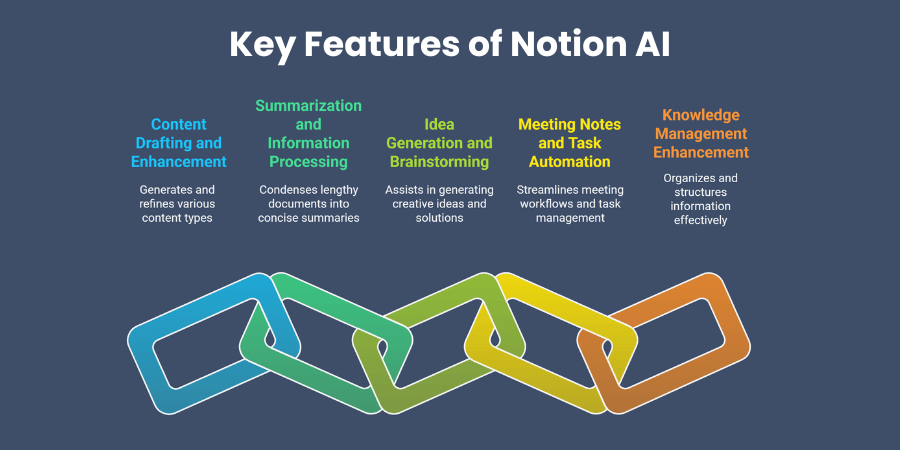
Content Drafting and Enhancement: Notion AI excels at generating first drafts of various content types, including blog posts, emails, social media updates, and product descriptions. Users can request specific tones, styles, or formats, and the AI adapts accordingly. It also offers editing capabilities such as rewriting for clarity, changing tone, fixing grammar issues, and translating content into multiple languages.
Summarization and Information Processing: One of Notion AI’s standout features is its ability to condense lengthy documents, meeting notes, or research materials into concise summaries. This functionality proves invaluable for quickly extracting key points from extensive information sources. The AI can identify main themes, action items, and critical insights without requiring manual review of entire documents.
Idea Generation and Brainstorming: When facing creative blocks, Notion AI serves as an effective brainstorming partner. It can generate topic ideas, outline structures, create lists, and suggest alternative approaches to problems. This capability extends to various domains including marketing, content strategy, product development, and project planning.
Meeting Notes and Task Automation: Notion AI streamlines meeting workflows by transforming rough notes into structured summaries with action items clearly identified. It can extract tasks from conversations, organize information into categories, and create follow-up schedules. This automation reduces the administrative burden associated with meeting documentation.
Knowledge Management Enhancement: Within Notion’s database environment, the AI assistant helps organize information more effectively. It can suggest categorization schemes, create structured templates, and generate consistent formatting across entries. This ensures knowledge remains accessible and useful throughout an organization. Tip: Leverage Notion AI’s summarization feature when dealing with lengthy research documents to quickly extract key points before diving deeper into specific sections.
What is ChatGPT?
ChatGPT represents a versatile conversational artificial intelligence developed by OpenAI. Unlike application-specific AI tools, ChatGPT functions as a general-purpose conversational assistant capable of addressing a wide range of topics and tasks through natural language interaction.
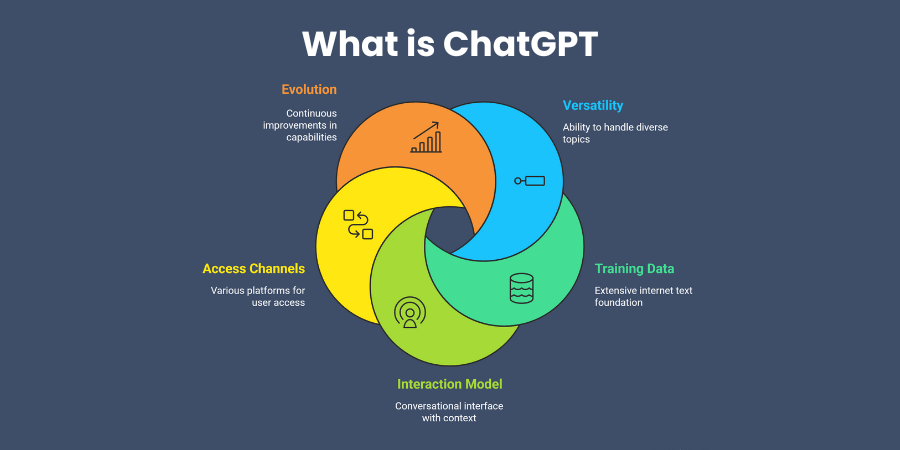
The foundation of ChatGPT lies in its extensive training on diverse internet text, which enables it to generate human-like responses across numerous domains. This broad knowledge base allows it to engage in conversations about science, literature, programming, business, creative writing, and countless other subjects. The model continues to evolve through both algorithmic improvements and human feedback mechanisms.
ChatGPT operates through a conversational interface where users submit prompts or questions, and the AI generates contextually appropriate responses. This interaction model resembles human conversation, with the AI maintaining context throughout exchanges.
Users can access ChatGPT through various channels including the OpenAI website, mobile applications, API integrations, and third-party implementations. The evolution of ChatGPT has been marked by significant improvements in reasoning capabilities, factual accuracy, and safety measures. Each new version has demonstrated enhanced abilities to understand complex instructions, generate more nuanced responses, and maintain coherence across extended conversations.
Key Features of ChatGPT
ChatGPT offers a diverse array of capabilities that extend beyond simple text generation:
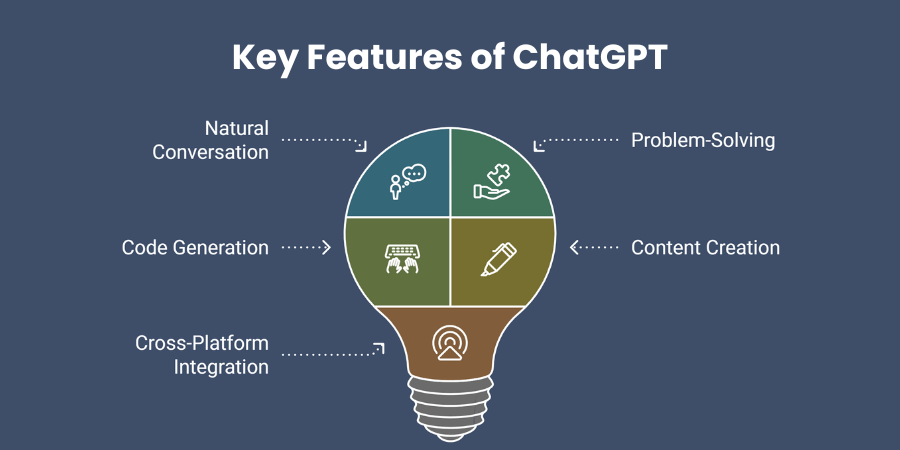
Natural Conversation and Contextual Understanding: ChatGPT excels at maintaining coherent conversations across multiple exchanges. The AI remembers previous messages within a conversation, allowing for contextual continuity that resembles human dialogue. This capability enables users to have extended discussions without repeatedly providing background information or context.
Problem-Solving and Analytical Assistance: Beyond conversation, ChatGPT demonstrates strong analytical capabilities across various domains. It can work through logical problems, explain complex concepts, analyze scenarios, and provide step-by-step reasoning. These abilities make it valuable for educational purposes, decision support, and critical thinking assistance.
Code Generation and Technical Support: Programmers and developers benefit from ChatGPT’s ability to generate functional code across numerous programming languages. The AI can write code snippets, debug existing code, explain programming concepts, and suggest implementation approaches. This technical capability extends to database queries, API documentation, and system architecture discussions.
Versatile Content Creation: ChatGPT functions effectively as a writing assistant for diverse content types. It can draft essays, articles, marketing copy, creative fiction, poetry, scripts, and business communications. The AI adapts its writing style based on specified parameters such as tone, audience, format, and purpose.
Cross-Platform Integration: Through its API and various implementations, ChatGPT integrates with numerous applications, websites, and services. This extensibility allows the AI to function within messaging platforms, productivity tools, customer service systems, educational applications, and entertainment services. The growing plugin ecosystem further expands these integration possibilities.
Notion AI vs. ChatGPT: Head-to-Head Comparison
If you’re exploring AI tools, two names that often stand out are Notion AI そして ChatGPT. While both are powerful, they serve slightly different purposes. Here’s a side-by-side comparison to help you decide which tool best fits your needs:
| Feature | Notion AI | ChatGPT |
| Functionality | Built into Notion, focused on improving productivity, summarizing notes, writing assistance, brainstorming, and task organization. | Advanced conversational AI for content creation, problem-solving, coding, research, explanations, and interactive dialogue. |
| Integrations | Seamlessly integrated with Notion workspace; limited external integrations. | Wide range of integrations through third-party apps, plugins, and APIs across different platforms. |
| Customization | Customizable inside Notion pages; tailored prompts for notes, summaries, and project management. | Highly customizable with custom instructions, plugins, and API for developers and businesses. |
| Pricing | Add-on to Notion plans (usually per user/month). Cost-effective for existing Notion users. | Free plan available; premium tiers (ChatGPT Plus/Team/Enterprise) with added features and priority access. |
| Ease of Use | Very easy for Notion users; requires no setup beyond enabling the AI feature. | User-friendly interface; can be accessed via web, apps, or integrated into workflows. |
| Best Fit Scenarios | Ideal for teams and individuals already using Notion for productivity and knowledge management. | Best for versatile use cases like writing, coding, tutoring, customer support, and professional research. |
Key Differences Between Notion AI and ChatGPT
Although both Notion AI and ChatGPT use advanced artificial intelligence technology, they serve different purposes for users. Notion AI is designed as a built-in productivity enhancer within the Notion workspace. It assists users in writing, summarizing, brainstorming, and refining content without leaving the Notion platform. Its role is to improve efficiency in task management, documentation, and note-taking.
ChatGPT, on the other hand, is not confined to a single platform. It functions as a versatile conversational AI that adapts to multiple contexts. Users rely on it for content creation, research, customer support, programming assistance, education, and more. Its flexibility makes it suitable for businesses, students, developers, and professionals across many industries.
The main point of divergence is scope. Notion AI improves productivity within one specific platform, whereas ChatGPT extends across countless scenarios. This distinction highlights why users choose one over the other based on their needs.
Comparison Table: Notion AI vs. ChatGPT
| Feature | Notion AI | ChatGPT |
| Primary Purpose | Enhances productivity inside Notion by assisting with writing and tasks | Functions as a versatile AI assistant across multiple industries |
| Platform | Integrated exclusively into Notion | Available on web, apps, and integrated into third-party platforms |
| Customization | Limited to Notion features and workspace tasks | Highly customizable with plugins, APIs, and third-party integrations |
| Functionality | Summarization, rewriting, brainstorming, task support | Content generation, coding help, customer service, learning assistance |
| Ease of Use | Seamless for existing Notion users | Requires learning how to prompt effectively for different use cases |
| Best Fit | Ideal for individuals or teams using Notion as a central workspace | Ideal for users seeking an adaptable AI for diverse professional needs |
| Pricing | Available as an add-on to Notion plans | Available in free and premium subscription models |
Similarities Between Notion AI and ChatGPT
Despite their different approaches, Notion AI and ChatGPT share several important capabilities:
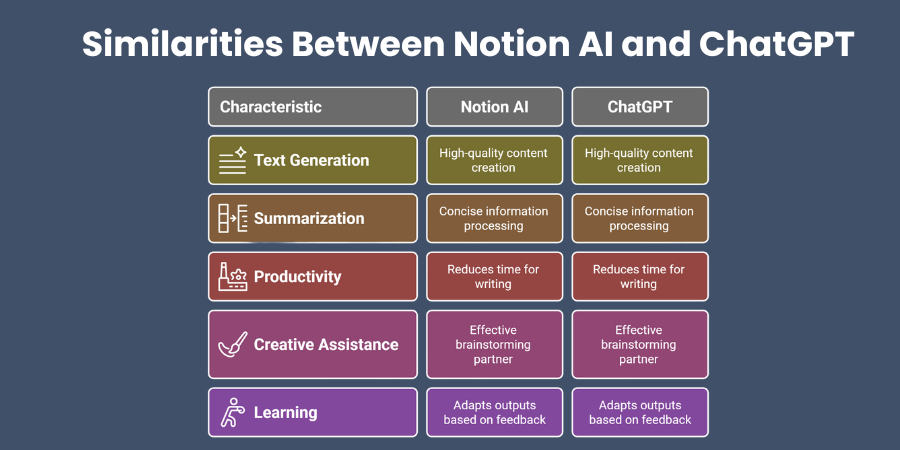
Text Generation and Content Creation: Both AI systems excel at generating high-quality written content across various formats. They can draft emails, create blog posts, compose social media updates, and develop other text-based content. Users can specify parameters such as tone, length, and style to guide the output of either system.
Summarization and Information Processing: A common strength between these tools is their ability to condense lengthy information into concise summaries. Both Notion AI and ChatGPT can extract key points from extensive texts, identify main themes, and present information in more digestible formats.
Productivity Enhancement: Both platforms significantly reduce the time required for common writing and information processing tasks. They eliminate blank-page syndrome by generating initial drafts, automate routine writing tasks, and provide starting points that users can refine.
Creative Assistance and Ideation: Notion AI and ChatGPT both serve as effective brainstorming partners. They can generate ideas, suggest approaches to problems, create outlines, and propose alternative perspectives. This creative assistance helps users overcome blocks and explore new directions.
Learning and Adaptation: Both AI systems demonstrate the ability to adjust their outputs based on user feedback and iterative prompting. Users can refine results through additional instructions, clarifications, or corrections, allowing for a collaborative process that improves outcomes.
Best Use Cases for Notion AI
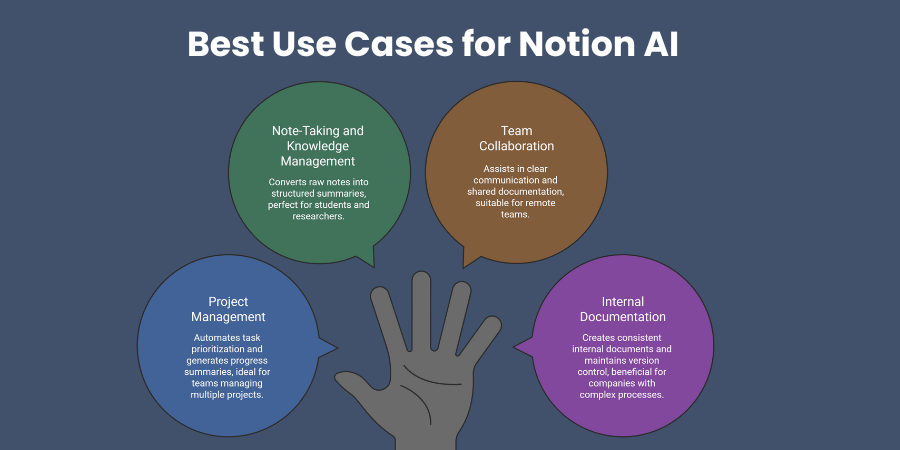
1. Project Management
Best For:
Teams and individuals who manage multiple projects, deadlines, and tasks in a single workspace.
対応業界:
Technology, marketing, consulting, education, and any organization requiring structured project tracking.
インパクト:
Notion AI automates task prioritization, generates progress summaries, and suggests actionable next steps. It reduces manual tracking and improves team accountability.
Example:
A marketing team uses Notion AI to track campaign progress. AI generates weekly updates, summarizes completed tasks, and highlights pending items for easier planning.
2. Note-Taking and Knowledge Management
Best For:
Students, researchers, and professionals who need to capture, organize, and retrieve information efficiently.
対応業界:
Education, research institutions, corporate training, and content creation industries.
インパクト:
Notion AI converts raw notes into structured summaries, highlights key points, and maintains consistent documentation style. It saves time during study or knowledge review sessions.
Example:
A research team collects meeting notes. Notion AI summarizes discussions into bullet points and organizes them in a searchable database, making information retrieval faster.
3. Team Collaboration
Best For:
Organizations that require seamless communication and collaboration across remote or hybrid teams.
対応業界:
IT, design, consulting, media, and corporate enterprises with distributed teams.
インパクト:
Notion AI assists in writing clear messages, generating shared documentation, and aligning teams on project goals. It reduces miscommunication and enhances workflow efficiency.
Example:
A software development team uses Notion AI to draft sprint plans, document user stories, and provide status updates, ensuring every member is aligned without repetitive meetings.
4. Internal Documentation
Best For:
Companies looking to maintain structured internal knowledge bases, standard operating procedures, and guidelines.
対応業界:
Corporate, healthcare, finance, education, and startups managing complex processes.
インパクト:
Notion AI creates consistent, easy-to-understand internal documents, updates content automatically, and maintains version control. It ensures employees always have access to current information.
Example:
A startup uses Notion AI to document HR policies and onboarding procedures. AI drafts updates and formats content consistently, reducing HR workload and improving new hire experience.
Best Use Cases for ChatGPT
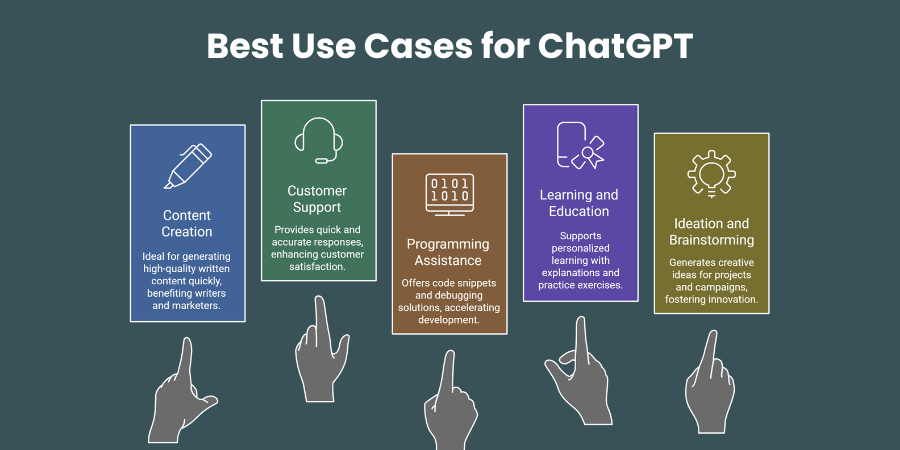
1. Content Creation
Best For:
Writers, marketers, and businesses that require high-quality written content quickly.
対応業界:
Marketing, media, e-commerce, education, and publishing.
インパクト:
ChatGPT generates articles, blog posts, social media captions, and ad copy instantly. It reduces content creation time and ensures consistent tone and style.
Example:
A digital marketing agency uses ChatGPT to draft multiple social media campaigns. AI generates engaging captions and blog outlines, freeing human writers for strategic tasks.
2. Customer Support
Best For:
Companies that need to provide quick and accurate responses to customers around the clock.
対応業界:
E-commerce, SaaS, finance, telecommunications, and healthcare.
インパクト:
ChatGPT handles frequently asked questions, resolves common issues, and escalates complex queries to human agents. It improves response time and customer satisfaction.
Example:
An online retailer integrates ChatGPT into their helpdesk. Customers receive instant responses about order tracking and product information, reducing support team workload.
3. Programming Assistance
Best For:
Developers, coding students, and software teams seeking debugging help or code suggestions.
対応業界:
Software development, IT services, tech startups, and education.
インパクト:
ChatGPT provides code snippets, explains programming concepts, and offers debugging solutions. It accelerates development cycles and reduces coding errors.
Example:
A web developer uses ChatGPT to generate Python scripts and troubleshoot JavaScript errors. AI provides clear explanations, saving hours of manual research.
4. Learning and Education
Best For:
Students, educators, and lifelong learners seeking explanations, tutoring, and study support.
対応業界:
Education, online learning platforms, research, and corporate training.
インパクト:
ChatGPT provides step-by-step explanations, creates practice exercises, and simplifies complex topics. It supports personalized learning and enhances comprehension.
Example:
A student learning statistics uses ChatGPT to solve problems, understand formulas, and generate study notes tailored to their curriculum.
5. Ideation and Brainstorming
Best For:
Entrepreneurs, creatives, and teams looking to generate ideas for projects, products, or campaigns.
対応業界:
Startups, marketing, product design, media, and content creation.
インパクト:
ChatGPT produces multiple creative ideas quickly, provides alternative perspectives, and sparks innovation without starting from scratch.
Example:
A product team uses ChatGPT to brainstorm features for a new app. AI suggests unique concepts, which the team refines into actionable plans.
Which is Right for You?
Choosing between Notion AI and ChatGPT depends on your goals, workflow, and the type of tasks you need assistance with. Both tools are powerful, but they serve different purposes.
- Individuals seeking structured productivity within one platform may find Notion AI more suitable for note-taking, personal project management, and writing assistance.
- Teams collaborating on projects or internal documentation can benefit from Notion AI’s integration into shared workspaces.
- Businesses needing versatile AI support across multiple departments, such as marketing, customer support, or product development, may prefer ChatGPT.
- Students looking for learning assistance, tutoring, or idea generation will benefit from ChatGPT’s flexibility across subjects and tasks.
Notion AI vs ChatGPT: Guidance Table
| User Type | Recommended AI | Key Reasons |
| Individuals | Notion AI | Ideal for managing tasks, notes, and personal projects within one platform |
| Teams | Notion AI | Enhances collaboration, project tracking, and internal documentation |
| Businesses | ChatGPT | Versatile across content creation, customer support, programming, and more |
| Students | ChatGPT | Supports learning, tutoring, practice exercises, and study material |
| Creatives | ChatGPT | Provides ideation, writing assistance, and brainstorming ideas |
| Productivity-Focused Users | Notion AI | Best for organizing work, automating workflow, and improving task efficiency |
結論結論
Notion AI and ChatGPT are both valuable tools powered by artificial intelligence, but they serve different purposes. Notion AI works best as an integrated productivity assistant within the Notion platform. It enhances project management, note-taking, collaboration, and documentation.
ChatGPT, in contrast, functions as a versatile standalone AI. It supports a wide range of tasks, including content creation, customer support, programming help, education, and brainstorming.
The right choice depends on user needs. Those seeking focused productivity within one platform may prefer Notion AI, while those requiring broader flexibility across multiple contexts will find ChatGPT more effective.
Both tools complement modern workflows and can greatly improve efficiency, creativity, and knowledge management.
FAQs
Can Notion AI work outside the Notion platform?
No, Notion AI is available only within the Notion workspace. It is built to enhance productivity inside the platform.
Is ChatGPT free to use?
Yes, ChatGPT offers a free version with limitations. A premium subscription provides faster responses and advanced features.
Which tool is better for students?
ChatGPT is generally more helpful for students. It can explain concepts, generate study materials, and provide tutoring assistance.
Can businesses use both Notion AI and ChatGPT together?
Yes, many organizations combine them. Notion AI improves project documentation, while ChatGPT supports customer service, content creation, and brainstorming.
Which tool is better for team collaboration?
Notion AI is better for collaboration because it integrates directly into shared workspaces and helps align team efforts.
Shaif Azad
Related Post
売上向上につながる対話型AIのユースケース
Are you frequently considering how technology could revolutionize your business operations? Conversational AI use cases are...
AIによるコスト削減の仕組み:ビジネス最適化ガイド
Are you lying awake wondering how your business can survive rising operational costs? Have you watched...
AIが需要予測の精度と意思決定をどのように向上させるか
Are you tired of watching your inventory costs spiral out of control while customers walk away...

